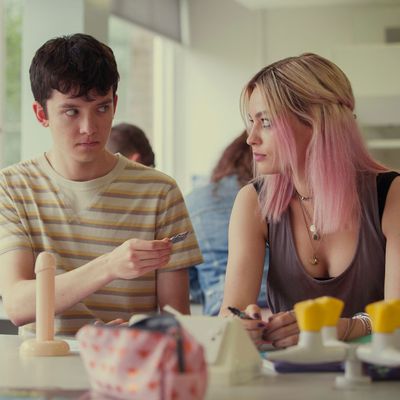
When I was in ninth grade, I sat with my peers in a dingy basement classroom in some forgotten corner of the school, trying to hold back giggles as we watched our gym teacher roll a condom onto a banana. It’s pretty much the only thing I remember from my high school sex-ed class, which glossed over topics such as masturbation, female pleasure, and queer sexuality in favor of teaching us how to protect fruit from STDs. Mostly, I learned about sex from the teenagers on TV and in movies — a more explicit, if still incomplete, course of study. From Degrassi, I learned you can get gonorrhea from giving a blow job. From The O.C., I learned that even “straight” girls are susceptible to the charms of Olivia Wilde with a purple streak in her hair. And when I started having sex, I learned that most of the stuff I had been taught was best forgotten in favor of the messiness of experiencing it all for myself.
Even though the statistics say that they’re having less sex than previous generations, today’s teens seem far better equipped to understand their nascent sexualities, at least when it comes to pop-culture. In schools across the country, the state of sex education is dire; only 24 states mandate sex-ed, and only half of high schools teach all the topics recommended by the CDC. But on TV, we’re living through a golden era of sex-positive representations of puberty and adolescence, and these shows stand to reshape a generation of young peoples’ understandings of their sexual selves. The most recent offering in this genre is Netflix’s Sex Education, which premiered last weekend and shows the range of teenage sexual experiences without ever casting judgment upon them or turning them into either a fantasy or cautionary tale. I wish I had seen it when I was a teenager.
In Sex Education, Asa Butterfield plays Otis, the son of sex and relationship therapist Jean, played by Gillian Anderson. They live in an idyllic country home filled with paintings of vulvas and illustrations from the Kama Sutra in some unnamed rural English town. When Otis’s classmate Maeve (Emma Mackey) realizes that Jean’s wisdom has trickled down to her son and given him erotic insight beyond his years, she encourages him to start moonlighting as a sex therapist to his peers and they begin charging their classmates his advice. “It’s weird,” one student tells him. “You’re like my age, but wise. You’re like my mum in a little man’s body.” Otis himself shifts easily into his sex therapist persona — wise, patient, understanding — despite his lack of personal sexual experience (Otis has his own sexual hang-ups and “can’t wank,” so to speak).
What Otis’s personal issue proves is that insight doesn’t have to come from experience, but from a willingness to actually listen and take the sex lives of his peers seriously — something few teen shows have cared to do. His “clients” include a girl who doesn’t want to have sex with the lights on because she hates her body, a Christian teen who can’t accept her boyfriend’s sex life prior to his born-again conversion, a newly out lesbian couple struggling with chemistry, a boy who’s confusing romance with stalking, and many others. When a classmate describes how she’s “always performing” what she thinks her male partners want, Otis suggests she spend some time exploring what she likes on her own (“you’re prescribing me a wank, doc?” she shoots back). The rest of his advice is equally sex-positive and non-judgmental, and the show itself manages to dive deep into the characters’ sex lives without ever feeling voyeuristic or creepy. (The actors, FWIW, are mostly in their 20s).
Many episodes of Sex Education take on this investigative, mystery of the week framework, except instead of solving crimes à la Veronica Mars, they are solving the psychological and emotional riddles Otis was raised (rightly) to believe are the roots of most sexual issues. The show spends a lot of time exploring Otis’ classmates’ inner lives, presenting sexuality as a part of the intricate web of people’s larger personalities and psychologies, instead of a garnish thrown on top to titillate or amuse.
Teenage sexuality has hardly been absent from TV, but its depiction has tended to veer between one of two poles — either idealized, melodramatic romance that doesn’t come close to capturing the sloppy awkwardness of real life, or quasi After-School Specials replete with sexual assault, diseases, unwanted pregnancies, and all of intercourse’s worst consequences. Other shows and movies have succeeded in depicting the “real” sex lives of teens, like Skins and Thirteen, but these tended to focus on the rarefied, sexually advanced cool kids. The kids on Sex Education are diverse — in race and sexuality and experience level and personality and psychology — and their stories are treated with equal amounts of nuance and sensitivity. Sure, depictions of sexual assault are important — and recent shows like 13 Reasons Why and Sweet/Vicious have dealt sensitively with this dark subject matter, but there’s value in showing teenage sexuality not as a danger, but as something normal and relatable that everyone has to learn how to deal with.
Sex Education isn’t the only show exploring the smelly, hairy recesses of puberty on TV in ways we’ve never seen before. Big Mouth, the animated Netflix comedy starring Nick Kroll and John Mulaney, follows a group of middle-schoolers aided through the wilds of puberty by creatures called “hormone monsters.” It’s easy to dismiss a show that has more than its fair share of cartoon dicks, but Big Mouth is funny and often deeply insightful, showing how the chaotic whirl of puberty can have very real emotional stakes, and insightfully depicting the differences between the female and male puberty experience. And next month, we’ll have Hulu’s PEN15, which features comedians Anna Konkle and Maya Erskine playing themselves as seventh graders, back in the year 2000, as they deal with all the growing pains of middle school. Big Mouth, a cartoon, and Pen15, with its Step Brothers–style casting, both innovate smart ways to be graphic about the realities of teen and preteen sexuality while never feeling creepy. Last year, I wrote praising films like The Tale and Eighth Grade for the way they make depictions of sexual assault more impactful by actually casting preteens; on the flip side, these shows eschew physical verisimilitude, and use humor to access psychological truths in a more in-depth manner than we’ve seen before.
What brought on this golden age of sex-positive teen shows? One reason might be that, as our culture grapples with all the ways sex and gender relations become skewed under patriarchy, show creators have a chance to explore the period of our lives where our ideas about sex were taking shape, and to rewrite them through a more feminist and sex-positive lens. All three of these shows have in-depth plotlines dealing with female masturbation, which has remained taboo on screen long after movies like American Pie and Superbad normalized male masturbation in film. In one episode of PEN15, Maya (the actors share the same names as their characters) discovers masturbation for the first time and we see how, awakened to her desires, everything begins to turn her on — an earlobe, an elbow, the lychees at the dinner table. When she finally confesses it to Anna, teary eyed, she confesses: “I’m like Sam [a male classmate who talks openly about masturbation], only I’m grosser cause I’m a girl. And I’m a pervert and I really shouldn’t be doing what I’m doing.” Anna comforts her, admitting that she does it too. “Really?” says Maya, a smile of relief breaking across her face.
In an interview with Jessica Pressler for New York, co-creator Maya Erskine explains how much it would have meant to her as a young girl to see female masturbation treated with the same nonchalance afforded to men. “As a young girl, you don’t see that it’s okay,” Erskine says. “I mean, to this day I have to do it under the covers,” she says. “It’s ingrained in me. When I’m exposed, I feel a sense of shame.”
I am not a parent or parenting columnist, so I won’t weigh-in on whether these shows are appropriate for young teens. I think at very least they should be required viewing for parents of teenagers, as a reminder of how difficult and endless-feeling these years can be, and that empathy, openness and acceptance are the best tools to cope when the hormone monsters inevitably rear their horny heads. Still, I couldn’t help but wish I’d had them to watch when I was a teen, when my body seemed like an impossible-to-solve riddle, and when I, like Maya, would have done anything to know I wasn’t alone.




